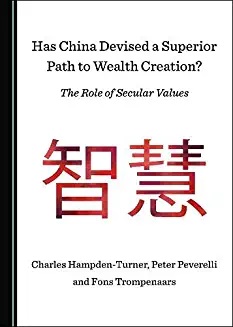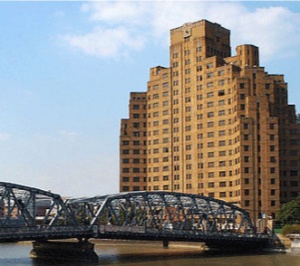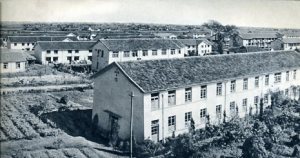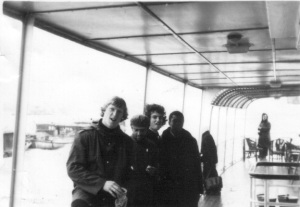We needed to backtrack part of the journey from Nanjing to Hangzhou to reach Shanghai, the final leg of our winter holiday. February 12, 1976: 7:00 am: left Hangzhou by train; arrived in Shanghai at 11:00 am.
We were even more excited about this final destination of our winter holiday than about the previous two. If you ask any number of people on the streets of any Western city to name one city in China, it will be either Beijing or Shanghai. The whole world seems to be in love with Shanghai now, but even in the 1970s, people knew about Shanghai’s reputation as ‘Paris of the East’, or ‘The Pearl of the East.’
Here is a video impression of Shanghai dating from 1973.
Many people were familiar with the fact that Shanghai used to have a large foreign community during the first half of the 20th Century, and that central Shanghai was filled with many Western-style buildings.
. . . The loudspeakers in the train already gave us a firm warning, when the train approached Shanghai Central Station. . .
. . . The introduction about Shanghai told us that the old Shanghai used to attract adventurers who lived their decadent lives in the city, on the expense of the immensely poor proletariat. . .
We had no problem with the expression ‘adventurers’, as we regarded ourselves as such. After all, we had given up an entire year of Western student life for a year in the frugal conditions of the Beijing Language Institute.
. . . If the hotels in Nanjing and Hangzhou had struck us as lush, our temporary housing in Shanghai was magnificent. We were lodged in the Shanghai Mansions, a high rise building just on the other bank of the Suzhou River, at the end of the famous bridge that features in so many postcards from Shanghai. . .
The introduction of our itinerary for Shanghai was different from what we had grown used to in Nanjing and Hangzhou. It was not presented by a professor of a local university, but by a rather standard Cultural Revolution government official with a greyish Mao suit. He was a representative of the Revolutionary Committee of Shanghai Municipality, a term that in those days was the equivalent of the Shanghai Municipal Board. What I remember most vividly from his speech was the frequent use of the word ‘revolution’.
That evening we feasted on champagne. I have mentioned earlier that I had joined the people who preferred Western food during this trip. To our surprise, there was more than Western food; the hotel had champagne on its beverage list. It was Chinese champagne though, a sweetish sparkling wine produced in Shandong, something like the German Sekt.
. . . All meals consumed during the trip were covered by the fee we had paid beforehand. The drinks had to be paid by us on the spot. We at the table with Western food simply could not resist ordering a couple of bottles of champagne to wash down the schnitzels and other deep fried food that then was regarded as typically Western by Chinese cooks.
The way the waiter handled the champagne was the second surprise. In spite of all the political campaigns denouncing capitalism and capitalist rituals, the waiters in Shanghai had apparently still been trained in the proper way to open a champagne bottle and poor the bubbly liquid. We at the ‘Western’ table enjoyed the ceremony of getting the bottles from the storage, opening them and filling the glasses. However, we loved the surprised reaction of our fellow students who were drowning their indeterminable morsels of whatever, dripping with the inevitable thick gravy, in beer, or tea. They had ordered their beverages without even bothering to have a look at the drink list.
I am not a champagne drinker, actually, and even less fond of Sekt. It is too sweet for my taste and lacks the complexity of a full-bodied red wine. However, that first evening in Shanghai, looking out over the famous Bund and the Huangpu River, in the hotel that had witnessed so much partying during the first half of the 20th Century, we had ourselves a feast. . .
The following morning we set off early, as the schedule would take us to an industrial suburb of Shanghai: Minhang, where we were to visit a gas turbine factory. Shanghai was an industrial city and then, much of the industry, including heavy industry, was located right inside the city.
The most interesting destination for us Dutch of that day, however, was the place where the first National Congress of the Party had convened in July 1921.
. . . an additional interesting dimension for me was the Dutch connection of that congress. The participants in the meeting included a representative of the Communist International that had its seat in the Soviet Union. The representative was using the code name Maring, but his real name was Henk Sneevliet, a Dutchman. . .
. . . The destiny of that location has been even more peculiar. The house is still a place where pilgrims from all over China line up, every day. It is part of a typical Shanghai neighborhood called: shikumen, a labyrinth of small houses separated by narrow alleys. This shikumen was leased to a Hong Kong developer who transformed it into a posh place to go shopping or wining and dining, called Xintiandi. It is one of the spaces where the expatriates in Shanghai typically hang out. . .
The following day, we got our first glimpse of how good Chinese doctors were at sewing back severed limbs during a visit to the Nr. 6 People’s Hospital of Shanghai.
. . . Not everyone in our group appreciated the stories about the gruesome accidents that happened frequently in the Chinese factories. Socialism had brought about considerable improvement in the lives of Chinese workers, but work place security had apparently been slighted. Listening to the introduction, it seemed as if there was no region in the world where more fingers, hands, feet, arms, or legs were cut off during regular work activities than in China.
Chinese culture must have played a role here as well. Chinese are adventurous. They like to experiment, trusting their gut feeling more than printed manuals written by experts. Mao himself had preached that there is no such thing as talent and that all people could learn anything, once you put yourself to it.
The ideal of the Cultural Revolution was creating a new homo sapiens universalis, one that was an integrated worker, farmer, and soldier. That was why urban teenagers were sent to the countryside: all Chinese should be able to grow their own food. . .
. . . applied to industrial production lines, that can be life threatening. Where a Western worker would first turn a machine off, before trying to retrieve a utensil that has fallen into the machine, or making adjustments to the machine’s settings, a Chinese worker may believe that it is possible to so do, while keeping the machine running. Chinese confidence in the own dexterity is infinite, but can cost you an arm and a leg, sometimes literally. . .
Several patients were asked to tell us their personal stories. My favorite story was that of a man whose arm had been severed by a machine. He told us with a straight face that he had immediately picked up the arm that was no longer part of his physical self with his still functioning one, and had run the hospital that was within walking distance from his factory. . .
Because our local hosts wanted to show how revolutionary Shanghai was, a visit to a rural commune in the suburbs was part of our schedule: the Maqiao People’s Commune.
. . . The distinctive feature of the Maqiao Commune was the manufacturing of concrete boats. Few of us will regard concrete as a self-evident material for boats, but it seems that the technique itself was not invented there. However, someone at some time had ventured to create a small concrete boat there to ship goods from the commune to the urban purchasing stations. . .
. . . What threatened to become a rather dull ending of our stay in Shanghai and of the entire winter holiday, turned into a topic for heated discussions in the bus back to the Shanghai Mansions. Our group roughly fell apart in two factions: the ones that regarded concrete boats as a brilliant idea and those who shelved it as yet another naive product of the Chinese of the Cultural Revolution.
Both factions had a point. Concrete surely was a useful alternative for wood in a region so far away from the nearest forest, while synthetic materials were not yet available, at least not to the Maqiao Commune. However, it was also definitely a product of the philosophy that strived to create the new man who could function as worker, farmer, and soldier simultaneously. While the farmer part was growing vegetables, the worker identity was thinking about a solution for their transportation to the hungry urban dwellers. The soldier part had to be put on hold for the next war. . .
There was still one thing you have to do in Shanghai. In the morning of Sunday, 15 February 1976, we made a boat trip over the Huangpu River, the river that divides Shanghai in a western and eastern part. That time, the eastern part consisted only of a small stretch of buildings. Currently, Pudong is probably the part of Shanghai most frequently cited in the Western media.
. . . As a Dutchman, I felt home on the water and must have enjoyed the trip, but not much of that can be retrieved from my diary. The skyline of Puxi, giving a perfect view on the Bund, the boulevard on the western bank of the Huangpu River, lined with Western buildings, erected since the westerners settled there in the late 19th Century, is spectacular.
It includes the Shanghai Customs House with its famous clock that used to chime ‘Westminster Quarters’, but was reprogrammed to chime ‘The East is Red’, China’s national anthem, during the Cultural Revolution. That was partly a move to get even with the foreigners who had governed that part of Shanghai for almost a century. The most famous occupant of the Customs House had been Sir Robert Hart who had held the post of inspector general there from 1864 to 1911. . .
We left the hotel right after lunch. We were to spend the afternoon and another night on the train. We were already bracing ourselves for the a long stretch in a cramped train compartment of that holiday trip.
We had a lot to think about and digest, obviously. Interestingly, we foreign students were not the only ones struggling with such feelings that last night in the train. I noticed that during a chat with Teacher Shen, one of the female teachers who had accompanied us during this trip, when she spontaneously started to criticise the representative of the Shanghai government who had introduced our itinerary.
. . . The man had struck me as a rather bleak, run of the mill, government official, but Teacher Shen who would have been screened thoroughly for her job, had a radar for the most subtle differences in choice of words, intonation, body language, and other ways of expressing ones opinion. She suddenly raised her voice and stated that she disliked that type of people who thought that they were better anyone else.
I failed to pinpoint the cues that made her so angry. However, in hindsight, I believe that the long-time aversion of Chinese of other regions against the Shanghainese played a role here as well. After all, Shanghainese like to tell the rest of world how great everything in Shanghai is and they continued that habit during the Cultural Revolution. Seen from this angle, Teacher Shen’s bawling probably was not an entirely political issue. The Shanghainese just had to claim that they were the best in every field, even in making revolution.
That short but intimate conversation with one of our teachers indicated that some real bonding had come out of traveling together for almost three weeks. I cannot think of a better end for such an adventure. . .
That was indeed an interesting way to end our journey. I had actually discovered political diversity in China.
If you like this story and would like to read all of it, you are invited to buy the book. Benelux citizens can order a copy, signed if needed, directly with the author. Others can order it at Amazon.




